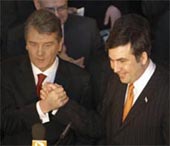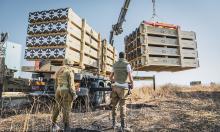"Democracy" On March
 Georgia and Ukraine are ready to challenge the Russian influence in the post-Soviet space.
Georgia and Ukraine are ready to challenge the Russian influence in the post-Soviet space.
One more outcome of the Kyrgyz political crisis is an exacerbation of rivalry over the influence in the post-Soviet space. The fact that this rivalry had already had a place before is incontestable. But until recently it involved Russia on one side and USA with EU on the other. From now on the situation has somewhat changed. The role of Russia's opponents is being tried on by Ukraine and Georgia.
It deserves reminding that the presidents of these two states have started reanimating the GUUAM alliance. Let's also remark that Kiev and Tbilisi positioned themselves actively during the recent elections in Moldova. They contributed a great deal to help the incumbent president, Mr. Voronin, to stay in office (Moldova's president is elected by the parliament, where Voronin's Communists has secured the majority, though not as overwhelming as earlier). It may seem strange that the Communist Voronin has something in common with the "democrats" Yushchenko and Saakashvili. But it was exactly the president of Moldova who, even before the parliamentary elections, proposed ardently to revive GUUAM. Though the other two GUUAM participants, Uzbekistan and Azerbaijan, haven't expressed their enthusiasm about this idea as yet, three countries are sufficient for a start, even if instead of GUUAM it will be just GUM.
It goes without saying that Kiev and Tbilisi couldn't ignore Kyrgyzstan's events. The Georgian foreign minister, Salome Zourabichvili, and her Ukrainian counterpart, Boris Tarasyuk, arrived in Bishkek on Thursday. Mrs. Zourabichvili told reporters before their departure that the ministers were delivering the messages of their presidents to Kyrgyzstan.
Mr. Tarasyuk in his turn informed journalists at Tbilisi's airport that during his one-day trip to Kyrgyzstan, two foreign ministers will try to gain a better understanding of the situation in this country.
Speaking about the messages of the presidents, Mr. Tarasyuk noted that "the main point of the proposals is to provide Kyrgyzstan and the Kyrgyz people with an opportunity to take profit of two presidents’ good offices".
"Our task is to clear up the situation, to what extent the Kyrgyz society and the opposition are ready to accept this mission", said Tarasyuk, cited by RIA Novosti. Having arrived in Bishkek, the ministers announced that they were willing to become mediators between the opposition and the president Akayev, who's staying in Russia now.
It's doubtlessly not disgraceful that Kiev and Tbilisi want to evaluate the situation in Kyrgyzstan. And there's nothing criminal in the messages of Yushchenko and Saakashvili. But why did the Ukrainian and Georgian officials undertake such a feverish activity only after Russian specialists of EMERCOM and the Ministry of Agriculture had visited Kyrgyzstan to assess the size of the would-be Russian aid to this country? And wouldn't it be better if Russia, Ukraine and Georgia provide this aide jointly?
However Ukraine and Georgia prefer acting "autonomously". That implies that Kiev and Tbilisi, as Mikhail Saakashvili declared the other day, don't intend to sit on their hands and let the initiative pass to Moscow. Of course Kyrgyzstan as such is not really important for Yushchenko and Saakashvili. But one shouldn't forget about many forecasts predicting the repetition of the Kyrgyz events in the other countries of the region, and first of all in Kazakhstan. The stakes will be much higher there. So any experience – positive or even negative – won't be useless.
Subscribe to Pravda.Ru Telegram channel, Facebook, RSS!




